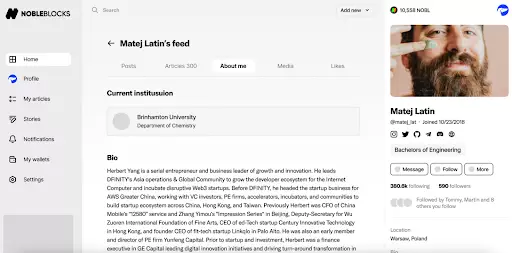Scientific publishing has long been dominated by traditional gatekeepers who benefit financially from the hard work of the scientific community. Scientific journals play a crucial role in spreading knowledge, but they face challenges such as article suitability, high fees, and complex review processes. Despite efforts to widen access through digital evolution, inefficiencies and access hurdles remain. The high fees charged by prestigious journals for publishing articles can range from $500 to over $6,000, creating barriers for researchers and institutions. While platforms like ArXiv and SciHub offer free access to research ideas, they lack quality control and authentication mechanisms, highlighting the need for modernizing the scientific publishing space.
Drawing parallels from disruptive transformations seen in other industries like music, media, and finance, it is evident that scientific publishing is ripe for an overhaul. Blockchain technology emerges as a transformative force against the inefficiencies and inequalities of science publishing and communication. Through the decentralized science (DeSci) model, blockchain streamlines the publication process, enhances the clarity of peer reviews, and fosters fairness. By leveraging blockchain technology, the DeSci model establishes a public infrastructure for creating, reviewing, storing, and distributing scientific knowledge fairly and equitably.
NobleBlocks is a platform that aims to reimagine the peer review process and mitigate biases in scientific publishing. By utilizing a blockchain-based decentralized science (DeSci) model, NobleBlocks creates a transparent and equitable review process that democratizes access to scientific knowledge. The platform eliminates steep processing fees, simplifies the publication process, and incentivizes quality peer reviews. Authors can use tokens to cover final steps like copyediting and publication, reducing financial barriers and ensuring a seamless transition from submission to public dissemination. The token-based economy of NobleBlocks empowers researchers to trade and exchange research hours directly, bypassing traditional financial barriers and expensive publishing fees.
NobleBlocks plans to integrate artificial intelligence (AI) further to improve the efficiency and capabilities of the publishing process. This adoption signifies a commitment to leveraging cutting-edge technology to enhance scholarly communication and data privacy. By embracing AI technology, NobleBlocks aims to streamline the publishing process, improve the quality of peer reviews, and enhance the overall experience for researchers, scholars, and innovators. This commitment to innovation sets a precedent for the future of scientific publishing in a digital age.
The future of scientific publishing lies in embracing blockchain technology and decentralized models like DeSci. Platforms like NobleBlocks are leading the way in revolutionizing the scientific publishing landscape by creating fairer, more accessible, and more efficient systems for sharing knowledge. By leveraging blockchain, AI, and token-based economies, we can build a future where traditional gatekeepers no longer hold sway over scientific research. It’s time to embrace the power of technology to shape a brighter future for innovation and discovery in the scientific community.


















